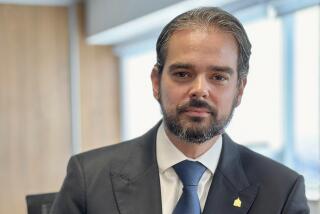WORLD REPORT PROFILE : Juergen Storbeck : EUROPE’S POLICE CHIEF : Terrorism. Drugs. Illegal entry. If a crime crosses national borders, it’s on the beat of Europol’s soft-spoken leader.
- Share via
BRUSSELS — Juergen Storbeck has a vision that makes sense: expanding the fight against organized crime across national borders. As head of Europe’s newest law enforcement agency, Europol, he’s making a start.
“At present there are no international police investigations on international [criminal] groups,” Storbeck said in an interview at European Union headquarters here. “We can’t create a European FBI, but my hope and expectation is that we can encourage and coordinate cooperation between EU states, where a British member of a task force investigates a group in Britain, a German the same group in Germany and a French team in France, so we can develop a more complete picture.”
For outsiders, the surprise is that such cooperation doesn’t already exist. But that’s the case. In the past, trust often stopped at the frontier.
Storbeck, 48, is a rare breed in the world of law enforcement--a man whose nature is to follow crime beyond his own country’s borders.
Born in the north German city of Flensburg, he studied law at universities in Bonn and Tubingen and developed an urge to travel. His soft-spoken, barely accented English, in addition to his native German, good French and a passing skill in Dutch and Italian, help him move easily in international circles.
He worked with special groups of European justice and interior ministers that, in the mid-1970s, constituted the Continent’s first attempt to coordinate national efforts to combat crimes such as international terrorism, drug trafficking and illegal immigration.
(While Interpol, the global police information exchange agency, also functions as a platform for common discussion, its resources are limited, its responsibilities restricted and its staff hard-pressed to focus on its 176 member nations.)
More recently, Storbeck provided technical assistance to architects of an agreement that threw open many of Western Europe’s borders in March, enabling passport-free travel between seven countries. In the early 1990s, he headed the Interpol unit at the German Federal Criminal Investigation Office in Wiesbaden.
He still communicates frequently with old contacts at Interpol.
“You can’t fight organized crime nowadays only from a national standpoint,” Storbeck said. “That’s why I applied for this job.”
While Storbeck’s comment is irrefutable, old habits die hard in Europe, especially the deep-seated suspicions police often hold toward outside agencies. The strength of these prejudices has made the birth of Europol agonizingly slow.
Created under the terms of the 1991 Maastricht Treaty on European union, Europol came into being officially two years later, when the treaty ratification was completed. Since then, haggling among the EU’s 15 interior ministers has blocked agreement on the legal convention needed to give Europol its full potential as an investigative agency.
A newly renovated building in The Hague has become Europol headquarters, but a majority of the offices remain vacant as the agency fills out its staff.
For its first 1 1/2 years, Europol was limited to narcotics enforcement, but in March it began working on the smuggling of nuclear materials, illegal trafficking of stolen cars and illegal immigration.
However, even with the early constraints, the absence of a central database and only a modest staff of around 90, Storbeck has gotten Europol off to an impressive start.
“In the first 15 months, we’ve been involved in more than 1,000 international cases,” he said. And he believes that, despite Europol’s restricted mandate, its credibility is growing with national law enforcement agencies.
“If we don’t show our quality, or promote our work, they won’t use us,” he said. “It’s as simple as that.”
In both words and demeanor, the man who could arguably be labeled Europe’s top cop displays no Kojak-like bravado.
Storbeck is a family man with a 15-year-old son, a daughter who is 10 and a direct, personable manner. Above all, he is a team player--someone who not only prefers to work away from the limelight, but who considers it a prerequisite for success.
Outsiders believe these characteristics, in addition to his language skills and experience, make Storbeck an ideal operator in an environment where turf battles between law enforcement agencies are often taken as seriously as crime itself.
“In the end, we’re just here to serve them [national law enforcement groups], so if they want to take the credit for a case with the press and the politicians, we’re not going to get in their way,” Storbeck said. “We’re not competing against anyone, and that’s very important. It’s our main advantage.”
So far, much of Europol’s work has been aimed at accelerating the exchange of important information, passing details of criminal activities from one member state to another in a few hours, a process that once took weeks or even months.
At Europol, information goes from the computer screen of the liaison officer in one country to that of his counterpart in another, who contacts the relevant national law enforcement agencies.
This replaces a practice in which requests were channeled through a bureaucratic obstacle course that ran from the local law enforcement agency to national level to the interior ministry, which in turn passed them to the foreign ministry. The foreign ministry contacted its counterpart in the second country and the process ran in reverse down to the local police agency.
The streamlined information exchange has paid off. Storbeck recalled a recent instance in which Belgian authorities planned to search a suspected drug laboratory they had kept under surveillance for weeks, but they decided to contact Europol when a car with Italian license plates arrived on the scene.
Within hours, Europol notified the Belgians that the car owner was a member of the Mafia and already under investigation in Italy for drug trafficking. Armed with this information, the Belgians delayed their search and worked with the Italians to conduct a combined bust a few days later in both countries.
“This kind of thing would have been impossible working through normal channels,” Storbeck said.
Europol also plays a crucial role in monitoring illicit drug shipments, taking tips from customs services at border crossings then coordinating surveillance across several countries, which lets Europol develop profiles of trade routes and criminal activities.
In order for the agency to do more, two things will have to happen: The heads of EU governments must agree upon and sign the Europol Convention when they meet later this month in the French Riviera resort of Cannes, then the convention must be ratified by the 15 national parliaments--a process that could take anywhere from 18 months to two years.
Senior officials of the EU, eager to prove they are taking the fight against crime seriously, want to move faster.
“I have repeatedly stressed that Europol has in a way become the symbol of the union’s work for a secure Europe,” said Anita Gradin, the European commissioner for internal and judicial affairs.
Storbeck says that Europol’s personnel strength would quickly jump to between 200 and 300 officers once the convention is ratified, but even then, he warns, the agency would still be no panacea.
“Expectations are too high,” he said. “We are a small unit that can be useful, but we’re certainly not the solution to everything.”
More to Read
Sign up for Essential California
The most important California stories and recommendations in your inbox every morning.
You may occasionally receive promotional content from the Los Angeles Times.










